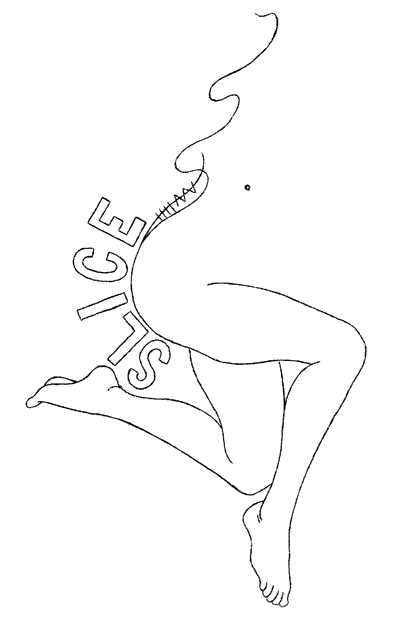.

Joe Brainard: cover for Slice, from Tom Clark's Once mimeo series, 1965
Fain would I kiss my Julia's dainty Leg,
Which is as white and hair-less as an egge.
Which is as white and hair-less as an egge.
Robert Herrick: Her Legs, from Hesperides, 1648
This post gratefully
remembers two longtime friends. The mimeograph stencil drawing at the
top is one of many wonderful works generously donated to grace divers early
and doubtless unworthy TC magazines and books (The Sand Burg, Stones, Air, Neil Young,
et al.) by the late great artist Joe Brainard. Joe was a dear friend
and remains a hero in art for me. Robert Herrick, a fine-work
goldsmith's son, has been a hero in poetry for me, lo these many
and sundry epochs. I could never wish to touch the hem of Robin
Herrick's garment in the art, yet with great pleasure from afar have
long been buoyed by its aethereal -- to borrow the term Herrick coined
out of need to describe the flow of Julia's clothing -- liquefaction.
Joe Brainard and Robert Herrick, in fact, have sometimes seemed to me
to possess certain similarities as artists. Both were self-effacing
virtuosi of the art of the clear line and the nonjudgmental embrace of
an evanescent and endlessly varying, wondrous world of appearances, as
though that world were indeed all that is. Both convey for me
something of a sense of what another cabinet-maker genius in this same
vein, Joseph Cornell, once called in a diary note "the 'all-over'
feeling that makes of the incidental a never ceasing wonder and
spectacle of the spiritual".



6 comments:
Visually appropriate and beautifully arranged as it is, I only wish your note regarding Brainard, Herrick (and Cornell) were larger because the comparison is so excellent, so unanticipated and is drawn so well. I'm pretty sure that it hasn't ever been conclusively established that it isn't the case that "that world were indeed all that is." Perhaps that's why I feel so good and in touch regarding Brainard and reading Herrick, compared to my usual less exalted reactions to the world. The dogs are barking and need attention. Thank you for providing such a good beginning of the day. Curtis
the line... the clear line, the straight-line, the curving line,
the long & the shoreline ... the secret is that
there is no secret:
if it ain't got that "swing" it ain't got that "thing"
this part of your piece/presentation just re:woke me up:
"(...)the art of the clear line and the nonjudgmental embrace of an evanescent and endlessly varying, wondrous world of appearances, as though that world were indeed all that is. Both convey for me something of a sense of what another cabinet-maker genius in this same vein, Joseph Cornell, once called in a diary note "the 'all-over' feeling that makes of the incidental a never ceasing wonder and spectacle of the spiritual"."
sometimes a line in a drawing makes "magic"
sometimes a line in a poem also same
when it is it is as Cornell says
after I recover from the cost of having put in a new sewerline (speaking of "lines") will get this Joe Brainard collected
now that I am past true age of becoming a mere 'copyist" time to read/look at "stuff" by those missed 1975-2000.
thanks for this post today.
Tom,
Whenas in silks my Julia goes,
Then, then (methinks) how sweetly flowes
That liquefaction of her clothes.
Next, when I cast mine eyes and see
That brave Vibration each way free,
O how that glittering taketh me!
(Looking at Slice, does it not seem that JB "got" something of HH's line?)
4.22
grey whiteness of fog against invisible
ridge, towhee standing on redwood fence
in foreground, sound of wave in channel
not in being but each other,
corresponding to here
for a second time, situated
side by side, another
silver of sunlight reflected in channel,
cloudless blue sky to the left of point
Yes!
Also by Herrick:
Robert Herrick: Life is the Bodies Light
Robert Herrick: Silks
Robert Herrick: The comming of good luck
This is such a lovely post, especially coming as it does in the midst of a period when the world may well seem to you at times something other than wondrous. Herrick was aware that life contains pain too, and no poet better expressed faith in pain's eventual end:
"Let me sleep this night away
Till the dawning of the day
Then at the opening of mine eyes
I and all the world shall rise."
I and all the world. So may it be!
You're very right, Chris. The oppressive sense of the physical which comes over one when the body is broken seems to cry out for nothing so much as for that irreplaceable form of therapy contained in a moment's reminder of the lightness of touch which very few things can provide -- specifically certain aspects of the natural, including the presence of animals, of growing things, and of the most delicate kind of art, experienced in just the right light... as the long day closes.
Post a Comment